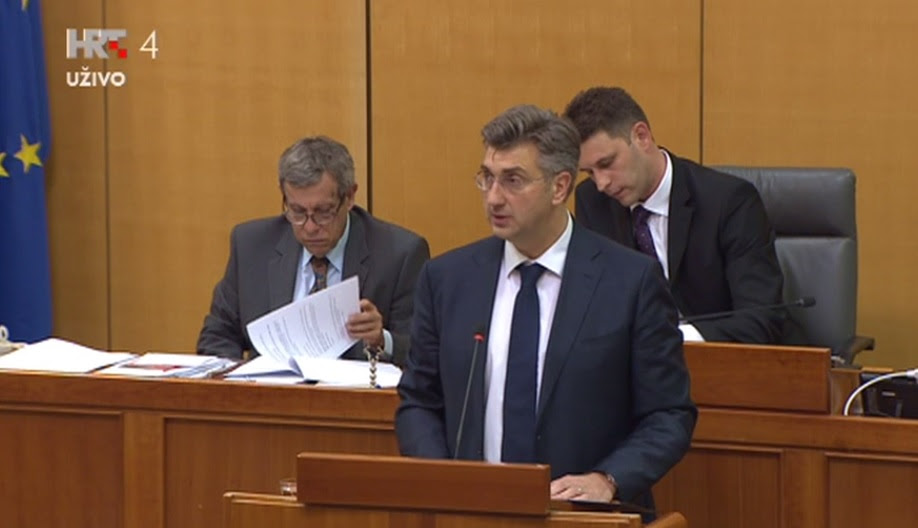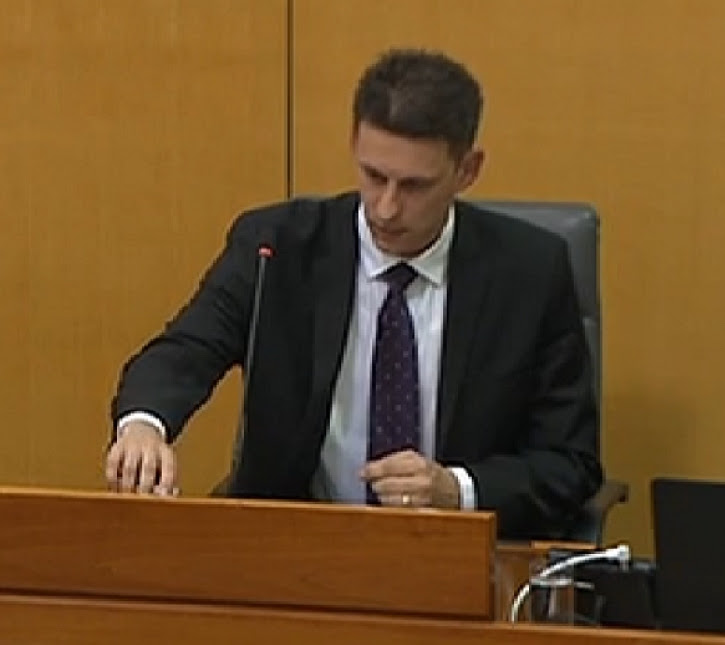
New Croatian Parliament
inaugural meeting 14 October 2016
(AP Photo/Darko Bandic)
I’m bursting with anticipation and curiosity waiting to hear whether Dr Zlatko Hasanbegovic will continue as minister for culture in the new Andrej Plenkovic led government of Croatia. Smaller parties and independents had huddled around HDZ (Croatian Democratic Union) and its leader Andrej Plenkovic with relative ease and a rather miraculous speed to support HDZ minority government receive the needed parliamentary majority goodwill for forming a government. But that government, i.e. the make-up of the government Cabinet (Ministers) is still a big enigma. It has remained an enigma even though the new Croatian Parliament had been convened and officially constituted on Friday 14 October 2014, with Bozo Petrov (leader of MOST/Bridge of independent lists as Speaker and HDZ/Croatian Democratic Union’s Miljan Brkic, Gordan Jandrokovic and outgoing Speaker Zeljko Reiner as deputy Speakers of the new parliament). Not even an inkling, yet, as to which of the elected members will be filling the all-important roles of government ministers. We are reassured, however, that the persons to serve as ministers in the new government will be announced during the coming week. “They” do say that good things come to those who wait. I shall hold destiny responsible to deliver on this.

Andrej Plenkovic Croatia's Prime Minister designate
Announces restructure of new government
in parliament Friday 14 October 2016
Photo: screenshot HRT news
Prime Minister designate, Andrej Plenkovic, has - amidst copious amounts of media speculation regarding who will and who will not get to serve as minister in his government - made it publicly clear last week that “I am the PM designate and nobody will determine the appointment of ministers,” (but me). Of course, it's a given that a PM must choose those people to serve as members of his/her government executive team he or she can best work with in order to achieve outcomes from the government’s set goals or program. The top goal for any government is to serve and promote national interests and Croatian national interests at this stage are significantly marked by the need to rid the country of the remnants of the unproductive and undemocratic practices still present due to habits instilled by the former communist regime of Yugoslavia. Things appear to be looking up in this sense as we learn that the delay in naming future government ministers may well be associated with therestructure of public administration and government being decided upon and announced. I.e., as announced by Plenkovic last Friday night Croatia is to have 19 out of 20 current ministries but a new ministry for demographics, family, the youth and social politics to be created from existing set ups with view to thrust into the front lines the solving of the falling birth rate and increasing emigration. To achieve a lesser number of ministries functions of some previous ones have been merged into new ones (merger into one ministry of economic, business and trade portfolios; the return to ministry of Croatia Veterans as opposed to the current veterans affairs, etc.) There will also be six instead of four Central government offices. State Secretaries will replace the current deputy-minister positions and the role of Assistant to the minister will in time transition into Head of Administration and will be filled via public advertising and competition, which in essence represents a very significant positive step in securing incumbents of important public administration position on the basis of merit (not political affiliation); the Heads of Administration will have the status of Servants (public servants), which means that after ceasing to work in that position the incumbent would not enjoy extended remuneration as assistants to ministers receive now. After Social Democrats’ representative suggested that the new structure will mean increased number of central bodies, thus suggesting increased government spending, Andrej Plenkovic replied: “There’s no intention to increase administration or expenses but the key intention is in increased rationalisation, increased outputs and de-politicisation and professionalisation of public administration,” reports HRT news. During this time of delay in naming the ministers of the new government HDZ and its leaders would do well in heeding the words and warnings regarding Croatian priority national interests contained in the statement released Saturday 15 October 2015 by the Croatian Bishops’ Conference. Croatian Bishops have called for the Croatian people and society to unity and maturity so that it would have the strength to endure the newly staged attempts in creating myths and in the spreading of lies. That is not a call to “return to the past”, but a motivation and a wish to free ourselves from the burden and the weights from the past that place a burden upon our today and blur our vision for the future, emphasised the Bishops’ statement.

Croatian Bishops' Conference
15 October 2016
Photo: Hrvatska biskupska konferencija
“The Bishops consider the current regard towards the victims of the communist regime, especially when it comes to mass graves and the remains of those that perished, in Croatia and in other places, especially in Slovenia, expressed by the relevant Croatian organisations and by the Croatian state generally as unacceptable and damaging,” says the Bishops’ statement in which Croatian Bishops emphasise that the upgrading of Greater Serbia myths neglects the suffering of the Croatian population during the Homeland War, the destruction of property…and the inadequate acknowledgement of Croatian veterans in the creation of freedom and independence. The Bishops call upon the appropriate Croatian government bodies to engage the necessary effort in order to place a light upon the truth of Jasenovac camps as well as upon the post-WWII sufferings. With this, the victims would receive due respect and the truth will usher in more peace into the families whose members have suffered…Bishops say.

Bozo Patrov
Speaker of Croatian Parliament
Photo: N1
It is a fact that Yugoslav communists who call themselves “the liberators” had from 1945 destroyed the Croatian civil society and committed the crime of murdering the country’s intelligence (the part that was not pro-communist). Hence, hundreds of priests, writers, journalists, publicists, cultural and social and political elites, engineers, lawyers, teachers etc. were liquidated, while others fled the country in order to escape sure death. The communists knew well that their success in ruling the people depended heavily on getting rid of the part of the country’s intelligentsia that was against communism. In modern Croatia, stripping Croatia of its most deserving son for its independence and democracy – Franjo Tudjman – had been a purposefully vilifying agenda for several years before Tudjmans death and after his death from 2000 when former communists’ win of government as well as Stjepan Mesic’s win of the country’s presidency followed. The official cultural pursuits or the ministry of culture under the left and centre-left leadership had played a large part in making sure that the condemnation of communist crimes does not pick up ground in any significant measure within the Croatian society. Ministry of culture has been and is a government body through which all publications, books, films, cultural associations etc must go in order to see the light of day. Thankfully, in his short role as culture minister of Croatia's short-lived previous government Zlatko Hasanbegovic had commenced the process of bringing balance into the ministry’s (the society’s) pursuits of Croatian truth, which of course meant that communist crimes needed to become an agenda to be openly and without reservations dealt with on the basis of facts and truth. This move of course earned him terrible blows and branded him as ultra-nationalist, Ustashe, fascist, revisionist …In other words, within six months of being Croatia’s minister for culture Hasanbegovic had declared his resistance to the cultural hegemony, or upon the dominant influence the communist Yugoslav left side of Croatia’s political playing field had wielded since late 1990’s when the so-called “detudjmanisation” commenced. Because of this, Hasanbegovic had been a target of terrible attacks within Croatia and beyond – staged and implemented by former communists and their mates, including the head of Istrael’s branch of Simon Wiesenthal Centre – filled with hateful lies.

From left: Miljan Brkic, Gordan Jandrokovic, Zeljko Reiner
HDZ's deputies of Croatian Parliament
Will these men manage to keep in check
the small-town-mayor-
turned-speaker-of-parliament
Bozo Petrov if once again he goes rogue against government leadership?
Photo: Patrik Macek/Pixsell
Although Andrej Plenkovic as designated PM has made it abundantly clear that he will not be influenced by anyone’s pressure in naming the ministers of his government and that the ministers will be those persons he himself chooses one can only pray and hope that his choice for culture minister is Zlatko Hasanbegovic. Having demonstrated some good insight and analysis skills so far one can only trust that Plenkovic has come to a realisation that by not naming Hasanbegovic as minister also means that he is joining the posse of liars against Hasanbegovic and also means joining the posse of anti-Croatian propaganda. Plenkovic’s move in the next couple of days will be interesting to watch because all eyes in Croatia and beyond seem fixed upon this very issue of whether Hasanbegovic is to continue as culture minister. If he does appoint Hasanbegovic then Croatia has a new lease of life for positive moves towards ridding Croatian public administration and associated processes of communist regime's progress-stifling remnants. If he does not appoint Hasanbegovic then Croatia’s reputation and daily reality are at a terrible loss and suffer a damaging setback in moving forward from the burdens of history that must be cleared – not swept under the carpet. Not naming Hasanbegovic as minister will also mean that Plenkovic either directly or vicariously agrees with the false allegations of neo-fascism/revisionism made against Hasanbegovic and Croatia. And so I wonder if the imminent announcement of new government ministers will feel like the door has just been kicked open (with unexpected and niggling surprises) or that it has just been opened – with the right mix of people eloquently showing through. Ina Vukic, Prof. (Zgb); B.A., M.A.Ps. (Syd)
|
|





Nema komentara:
Objavi komentar